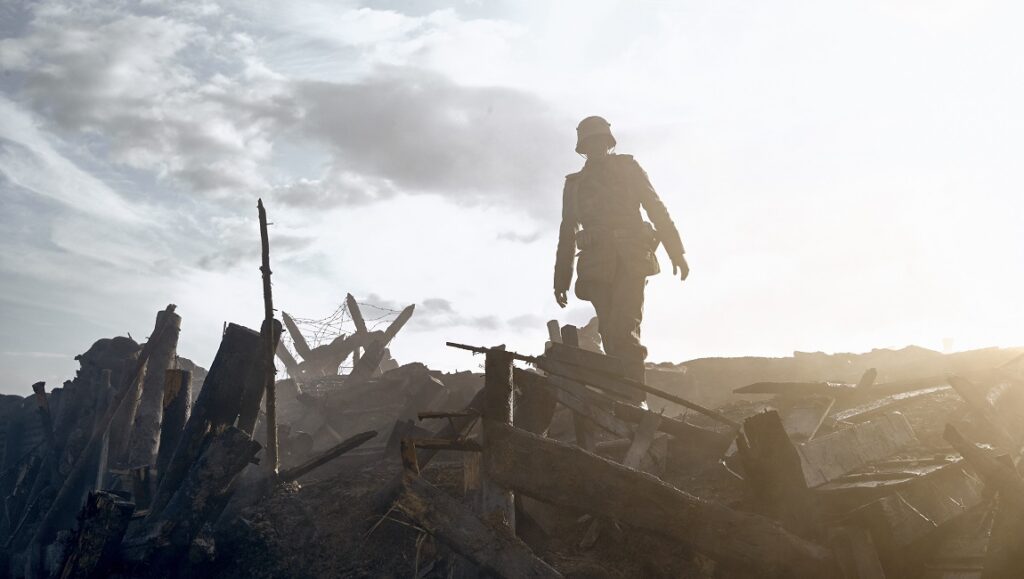This latest adaptation of All Quiet On the Western Front is a slick affair that trades in shallow aesthetics at the expense of any real substance.
“This book is to be neither an accusation nor a confession, and least of all an adventure, for death is not an adventure to those who stand face to face with it. It will try simply to tell of a generation of men who, even though they may have escaped its shells, were destroyed by the war.” Erich Maria Remarque’s famous 1929 anti-war novel All Quiet on the Western Front makes the WWI veteran’s intent unmistakably clear. Describing the hell of trench warfare, the book has been adapted numerous times across a variety of media and has seen its most enduring film adaptation, Lewis Milestone’s 1930 classic of the same name, enter the Library of Congress’ National Film Registry. A 1979 television film was also produced for CBS, but Edward Berger’s latest marks the first time the pacifist text has been adapted in Remarque’s home country of Germany.
The film follows the 17-year-old Paul Bäumer (Felix Kammerer) as he and his friends, encouraged by the pervasive jingoism in WWI-era Germany, enlist in the Imperial German Army in 1917. Their rah-rah fervor is quickly dampened, however, once they reach the Western Front and come face-to-face with the hideous reality of what remains one of humanity’s deadliest conflicts. The horror truly sets in when Paul’s friend Ludwig (Adrian Grünewald) is killed by artillery fire on their first night. A year later, in response to mounting casualties, Matthias Erzberger (Daniel Brühl) meets with German High Command and tries to convince them to negotiate an armistice with the Allied powers, but fearing defeat and humiliation, they prove resistant to the idea. Meanwhile, Paul has adjusted to his new circumstances even as the war has taken its toll on him, as well as his comrades. But even while the end of the fighting draws near, tragedy continues to befall Paul and his fellow soldiers.
Francois Truffaut famously argued that “there’s no such thing as an anti-war film,” a statement widely interpreted to mean that the excitement of battle scenes, as well as the depiction of camaraderie between soldiers, would unavoidably glorify the grim realities of war. Berger must have had that quote in the back of his mind, since his self-conscious take on the novel does its damndest to constantly remind the audience that war is, in fact, bad. But in terms of messaging, there’s nothing here that the book — or Milestone’s film — didn’t convey in a superior manner. As a matter of fact, this latest adaptation omits some of the most emotionally affecting, and politically charged, scenes that made its predecessors so impactful, instead rendering the war as something akin to a natural disaster, prolonged by hubris, sure, but ultimately caused by no one in particular, a stark contrast from Remarque’s source material, which highlighted Germany’s political climate in relation to the conflict. And the powerful scene where Paul is forced to kill a French soldier and is overcome with regret as he watches his supposed enemy die an agonizingly slow death, isn’t built upon so much as it is merely prolonged, and Lew Ayres’ vulnerable, exhausted weeping in the 1930 version is replaced by Kammerer’s dissociative stare — a fairly predictable, and shallowly contemporary, choice.
All Quiet on the Western Front‘s showy style invites comparisons to Sam Mendes’ 1917, while its intense, gritty battle scenes recall Spielberg’s Saving Private Ryan, death constantly surrounding its characters in a hauntingly matter-of-fact way. All Quiet seems single-mindedly committed to depicting war’s atrocities, but this goal clashes heavily with its glossy, prestige sheen. Berger’s approach is all aesthetics, unfortunately, and at times, it can’t help but feel like a parody of this kind of stern, theme-focused filmmaking. In service of the supposed message, little attention is paid to the human stories, the individual fates and tragedies, and as a result, they end up getting lost in all the noise that the Hollywood production style brings with it. This sensibility not only saps the film of its humanity, but also makes it feel conventional, as even when juxtaposing the filthy trenches with the decadent dining rooms that the generals feast in — an obvious, even trite observation at this point — the film makes sure to underscore the generous dinner with classical music to really drive the point home.
When the credits finally start rolling after almost two and a half hours, the question of what exactly this film brings to the table will undoubtedly linger in many viewers’ minds. It’s certainly not completely devoid of powerful moments, but those are usually either lifted from Milestone’s pre-Code epic or from more recent war films, particularly those made in America. Taking cues from Hollywood is especially puzzling, since works like Elem Klimov’s harrowing 1985 masterpiece Come and See would seem to offer a more appropriate template for depicting the soul-crushing abyss of a world war. Our conflict-laden times could no doubt use some bold political filmmaking, but Berger’s grim posturing isn’t in service of making a statement, or, God forbid, actually ruffling any feathers — is there anyone who generally disagrees with the “war is bad” sentiment? — but rather in outdoing his fellow filmmakers by subjecting us to more slick, inhuman brutality. It’s well-made, and for many it will likely be a somewhat affecting experience. But in the words of Robert Christgau, “Someday, archaeologists will wonder just exactly what was the point. I wonder now.”
You can currently stream Edward Berger’s All Quiet on the Western Front on Netflix.


Comments are closed.